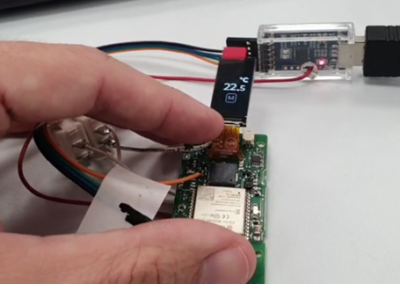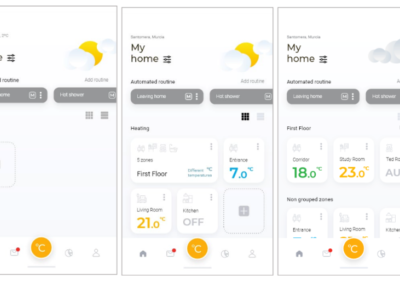Experiments
SMART ECO-COMFORT
![]() AgoraDIH
AgoraDIH
Experiment objective
SMART ECO-COMFORT Experiment will be focussed to exploit the comfort index (CI) concept and use ROINTE talent and experience to improve heating efficiency, through a new always-on connected platform of radiators. All of them deployed across Europe, by a manufacturing SME in the Region of Murcia.
The comfort index is subjective (Wang Z et al ,2006; ARENS E, et Al 2009, Yatim et Al, 2011)] and mainly takes into account room humidity and temperature to create a comfortable sensation for the user. Right now, we are setting a comfort index in a laboratory process, that also measures energy consumption, in every ROINTE radiator model. Performance, efficiency, reliability and quality are intrinsic parameters for our design and product department, but as the comfort Index depends on a mix of human sensations, building construction, social and cultural habits, it can be difficult to prove a characterization model.
Keeping in mind this CI concept, in this experiment we will design and introduce a new, smart unit control (CPS) inside our radiators. They’ll be connected to a complete list of sensors (Temperature, Humidity, Presence, ..), an APP (Android/iOS/Web) and an IoT cloud platform to collect and manage usage data. Such data will be analysed to figure, as the first goal, a heterogenous comfort index. All data will be anonymous and geo-located in a real time and historic NoSQL databases. External data like weather, solar radiation maps, building information (cadastre) and electric energy costs will also be used to compute correlations across the usage of heating. It will mean that energy efficiency could be evaluated and managed by customers in a comfort index range. We will develop a smart assistant to programming, that optimize energy costs based on regulated tariffs, keeping the limits of a personalised comfort index if desired.
Challenges
SMART ECO-COMFORT Experiment will be focussed to exploit the comfort index (CI) concept and use ROINTE talent and experience to improve heating efficiency, through a new always-on connected platform of radiators. All of them deployed across Europe, by a manufacturing SME in the Region of Murcia.
The comfort index is subjective (Wang Z et al ,2006; ARENS E, et Al 2009, Yatim et Al, 2011)] and mainly takes into account room humidity and temperature to create a comfortable sensation for the user. Right now, we are setting a comfort index in a laboratory process, that also measures energy consumption, in every ROINTE radiator model. Performance, efficiency, reliability and quality are intrinsic parameters for our design and product department, but as the comfort Index depends on a mix of human sensations, building construction, social and cultural habits, it can be difficult to prove a characterization model.
Keeping in mind this CI concept, in this experiment we will design and introduce a new, smart unit control (CPS) inside our radiators. They’ll be connected to a complete list of sensors (Temperature, Humidity, Presence, ..), an APP (Android/iOS/Web) and an IoT cloud platform to collect and manage usage data. Such data will be analysed to figure, as the first goal, a heterogenous comfort index. All data will be anonymous and geo-located in a real time and historic NoSQL databases. External data like weather, solar radiation maps, building information (cadastre) and electric energy costs will also be used to compute correlations across the usage of heating. It will mean that energy efficiency could be evaluated and managed by customers in a comfort index range. We will develop a smart assistant to programming, that optimize energy costs based on regulated tariffs, keeping the limits of a personalised comfort index if desired.
Another of our objectives is to prevent heating (energy) inefficiencies due to miss behaviours or human errors that could reach great levels in some cases. We will deploy infrared (IR) sensors to detect presence and proximity via Bluetooth in the room so it could generate alarms or notifications to an APP and/or actions via a programmed rule in the radiator, saving overall energy and looking to be smartly, eco-friendly.
As the final result of the experiment, we will be able to develop a smart assistant that takes into account the comfort Index and can prevent and optimize energy efficiency easily. Our smart assistant will be compatible since beginning with Amazon Alexa and other guided voice services to offer an easy multi-language interaction. It will also be personalized, scalable to several units and adaptable to regions, weather and energy costs.
Implementation Solution
The experiment is divided on follow work packages.
WP1(Project Management): This work package contains all the necessary tasks to assure proper and continuous communication with the DIH-WORLD partners.
WP2(IoT Platform Ingress – HW&SW): Test, measure and evaluate a set of IoT platforms (Back end) in terms of security, scalability, interoperability (openstack), reliability, O&M, IoT protocols adaptability and ML tools and perform initial configuration (devops) of selected one. Concept and design of integrated circuit (HW prototype) with sensors and communications modules and firmware. Develop a useful dashboard and integration in APPs (Android and IOS), collecting geolocation and end-user data to final IoT platform with OS permissioned data. End to End test to ingress data from IoT devices.
WP3(IoT Platform Data Analysis- Comfort Index model): Design a front-end platform, multilingual and multiplatform, to be performed via HTML5 that support customers APP and dashboards professional connection.
WP4(IoT Platform Data Analysis- Comfort Index model): Support to Data structures, DDBB architecture and API in the design phase.
WP5 (Dissemination Plan): Preparation of all documents and content available to social media and events /workshops.
Dissemination
Round table: The EDIH of the Valencian Community and Murcia (12/11/2021)
https://www.linkedin.com/posts/pedroarques_eenmeetingspain-activity-6864982265714266112-v7a6
Kick Off metting at Rointe




